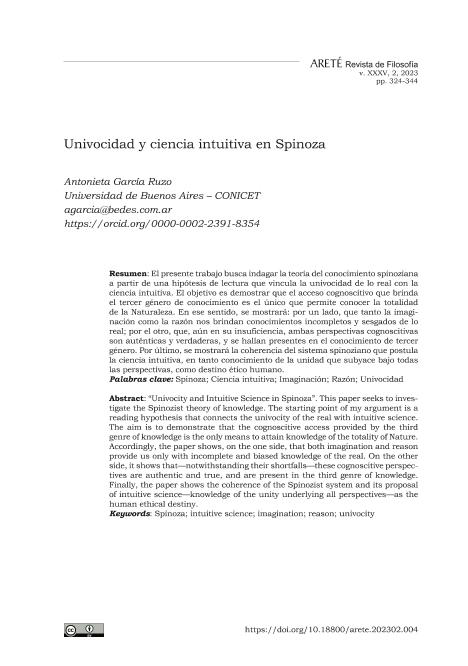Mostrar el registro sencillo del ítem
dc.contributor.author
García Ruzo, Antonieta

dc.date.available
2023-12-27T12:54:11Z
dc.date.issued
2023-12
dc.identifier.citation
García Ruzo, Antonieta; Univocidad y Ciencia intuitiva en Spinoza; Pontificia Universidad Católica del Perú. Departamento de Humanidades; Areté; 35; 2; 12-2023; 324-344
dc.identifier.issn
1016-913X
dc.identifier.uri
http://hdl.handle.net/11336/221541
dc.description.abstract
El presente trabajo busca indagar la teoría del conocimiento spinoziana a partir de una hipótesis de lectura que vincula la univocidad de lo real con la ciencia intuitiva. El objetivo es demostrar que el acceso cognoscitivo que brinda el tercer género de conocimiento es el único que permite conocer la totalidad de la Naturaleza. En ese sentido, se mostrará: por un lado, que tanto la imaginación como la razón nos brindan conocimientos incompletos y sesgados de lo real; por el otro, que, aún en su insuficiencia, ambas perspectivas cognoscitivas son auténticas y verdaderas, y se hallan presentes en el conocimiento de tercer género. Por último, se mostrará la coherencia del sistema spinoziano que postula la ciencia intuitiva, en tanto conocimiento de la unidad que subyace bajo todas las perspectivas, como destino ético humano.
dc.description.abstract
This paper seeks to investigate the Spinozist theory of knowledge. The starting point of my argument is a reading hypothesis that connects the univocity of the real with intuitive science. The aim is to demonstrate that the cognoscitive access provided by the third genre of knowledge is the only means to attain knowledge of the totality of Nature. Accordingly, the paper shows, on the one side, that both imagination and reason provide us only with incomplete and biased knowledge of the real. On the other side, it shows that—notwithstanding their shortfalls—these cognoscitive perspectives are authentic and true, and are present in the third genre of knowledge. Finally, the paper shows the coherence of the Spinozist system and its proposal of intuitive science—knowledge of the unity underlying all perspectives—as the human ethical destiny.
dc.format
application/pdf
dc.language.iso
spa
dc.publisher
Pontificia Universidad Católica del Perú. Departamento de Humanidades
dc.rights
info:eu-repo/semantics/openAccess
dc.rights.uri
https://creativecommons.org/licenses/by/2.5/ar/
dc.subject
CIENCIA INTUITIVA
dc.subject
SPINOZA
dc.subject
UNIVOCIDAD
dc.subject
FELICIDAD
dc.subject.classification
Filosofía, Historia y Filosofía de la Ciencia y la Tecnología

dc.subject.classification
Filosofía, Ética y Religión

dc.subject.classification
HUMANIDADES

dc.title
Univocidad y Ciencia intuitiva en Spinoza
dc.title
Univocity and Intuitive Science in Spinoza
dc.type
info:eu-repo/semantics/article
dc.type
info:ar-repo/semantics/artículo
dc.type
info:eu-repo/semantics/publishedVersion
dc.date.updated
2023-12-26T13:42:05Z
dc.identifier.eissn
2223-3741
dc.journal.volume
35
dc.journal.number
2
dc.journal.pagination
324-344
dc.journal.pais
Perú

dc.journal.ciudad
Lima
dc.description.fil
Fil: García Ruzo, Antonieta. Consejo Nacional de Investigaciones Científicas y Técnicas; Argentina. Universidad de Buenos Aires; Argentina
dc.journal.title
Areté
dc.relation.alternativeid
info:eu-repo/semantics/altIdentifier/url/https://revistas.pucp.edu.pe/index.php/arete/article/view/27919
dc.relation.alternativeid
info:eu-repo/semantics/altIdentifier/doi/https://doi.org/10.18800/arete.202302.004
Archivos asociados
